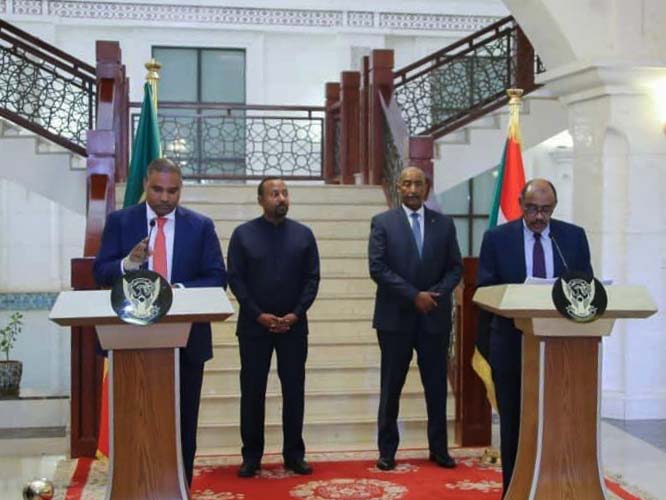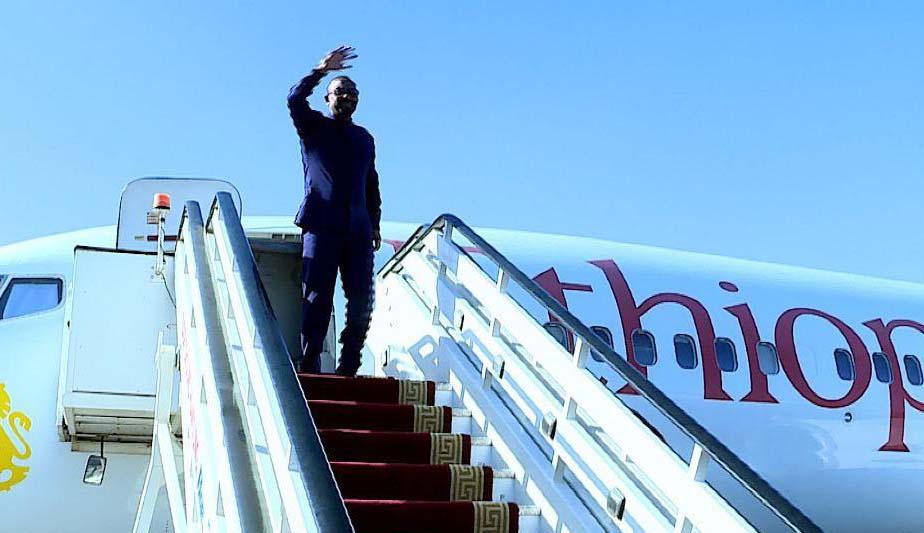Ethiopian PM Abiy visits Sudan

Ethiopian Prime Minister Abiy Ahmed during his short visit to Khartoum e (SUNA)
Khartoum – January 27, 2023
Ethiopian Prime Minister Abiy Ahmed Ali arrived in Khartoum yesterday for a short visit to Sudan. There, he spoke with Sudanese leaders about political issues concerning both countries, including the Grand Ethiopian Renaissance Dam (GERD), border demarcations, and Sudan’s political transition.
The Ethiopian Prime Miniter was accompanied by the Ministers of Defence, Peace and Interior Affairs, the Government Communications Office, the Ethiopian Deputy Minister of Foreign Affairs, the National Security Adviser, and the Director of Ethiopian Intelligence.
Abiy spoke with Chairman of the Sovereignty Council and Commander of the Sudan Armed Forces (SAF) Lt Gen Abdelfattah El Burhan and held a meeting with the Vice-President of the Sovereignty Council and Commander of the paramilitary Rapid Support Forces, Mohamed ‘Hemeti’ Dagalo.
In a statement, Sudan’s Sovereignty Council said that the talks during the visit were concerned with “ways to strengthen and enhance bilateral relations”.

Political transition
During his talks with Lt Gen El Burhan, Abiy said that his one-day visit to Khartoum aims to express solidarity with Sudan at this crucial political stage, referring to current negotiations on a democratic transition agreement.
During his visit, the Ethiopian PM said on social media: “I’m pleased to come back again and be amidst the wise and vibrant people of Sudan. My appreciation to General Abdel Fattah al-Burhan for the warm welcome”.
“Ethiopia continues to stand in solidarity with Sudan in their current self-led political process,” he added.
Abiy said that he did not present new proposals for the current political process during his meeting with Sudanese political parties and stressed that he is confident in the ability of the Sudanese to overcome their political issues autonomously.
‘Ethiopia continues to stand in solidarity with Sudan in their current self-led political process’ – PM Abiy Ahmed
During his meeting with the Ethiopian Prime Minister at the Republican Palace, Hemeti confirmed his commitment to implement agreements to achieve stability in the country and the need for the parties to cooperate in implementing the Framework Agreement to overcome the political crisis and complete the transitional period.
During his meeting with a delegation from the Liaison and External Relations Committee of the Forces for Freedom and Change-Central Council (FFC-CC) at the Republican Palace, the Ethiopian PM expressed his support for everything that the people of Sudan agree upon and said he will support the result of the negotiations.
El Wasig El Bereir, Secretary-General of the National Umma Party (NUP) and member of the Executive Bureau of the FFC-CC, said in a press statement after the meeting that Abiy Ahmed stressed the importance of the process being entirely Sudanese without allowing any external party to interfere or impose any solutions.
He said that the PM called for the speedy completion of the political process and welcomed the upcoming visit of an FFC-CC delegation to Ethiopia.
Mediator role
Journalist, political analyst, and newly elected Chair of the Sudanese Journalists Syndicate Abdelmonim Abu Idris told Radio Dabanga that the visit of the Ethiopian Prime Minister comes at a time of competition between Ethiopia and Egypt over the Sudanese transition, pointing out that the visit is linked to Egypt’s initiative to host Sudanese negotiations Cairo in February.
The signatories of the agreement, led by the FFC-CC, rejected the Egyptian initiative because the dialogue process on the remaining five issues “cannot be changed at the last moment”.
Abu Idris explained that Abiy ‘s visit to Khartoum is likened to the role of the Sudan Quartet (USA, Saudi Arabia, UAE, and UK), especially since he visited the UAE before his visit to Khartoum.
He expected the visit to lead to a breakthrough in the political process, pointing out that the Ethiopian move is based on a previous legacy represented in the mediation that led to the signing of the 2019 Constitutional Document by the military and the FFC, after which the government of PM Abdallah Hamdok was formed.
He considered Ahmed’s announcement that he did not propose a specific mediation as ‘a well-known Ethiopian tactic’ that was used during the mediation that led to the signing of the Constitutional Document.
He did not rule out that the Ethiopian Prime Minister proposed the return of Hamdok to the position of prime minister, especially because of Hamdok’s close relations with Ethiopia and understanding of its political context.
GERD
The PM stressed that the Great Ethiopian Renaissance Dam (GERD) will not cause any harm to Sudan but will allow the country to benefit from the dam’s electricity. El Burhan confirmed that Sudan and Ethiopia are compatible and in agreement on all issues of the Renaissance Dam.
Sudan expressed its hopes the dam will regulate the annual rainy season floods and generate electricity but, in the past, has also voiced fears that its population’s safety, water supply, and its own dams will suffer from the GERD if there is no proper agreement.
Border demarcations
With regard to the issue of border demarcations between the two countries, Abiy said that it is an old issue and documents on the issue need to be consulted. The Chairman of the Sovereignty Council affirmed that documents, technical committees, and dialogue represent the basis of the demarcation process.
The 1,600 kilometres border between Sudan and Ethiopia was drawn in colonial times. No clear demarcation of the border has been made since Sudan became independent in 1956. The lack of clear border markers has made it easy for Ethiopian militants to occupy fertile farmlands in eastern El Gedaref.











 and then
and then